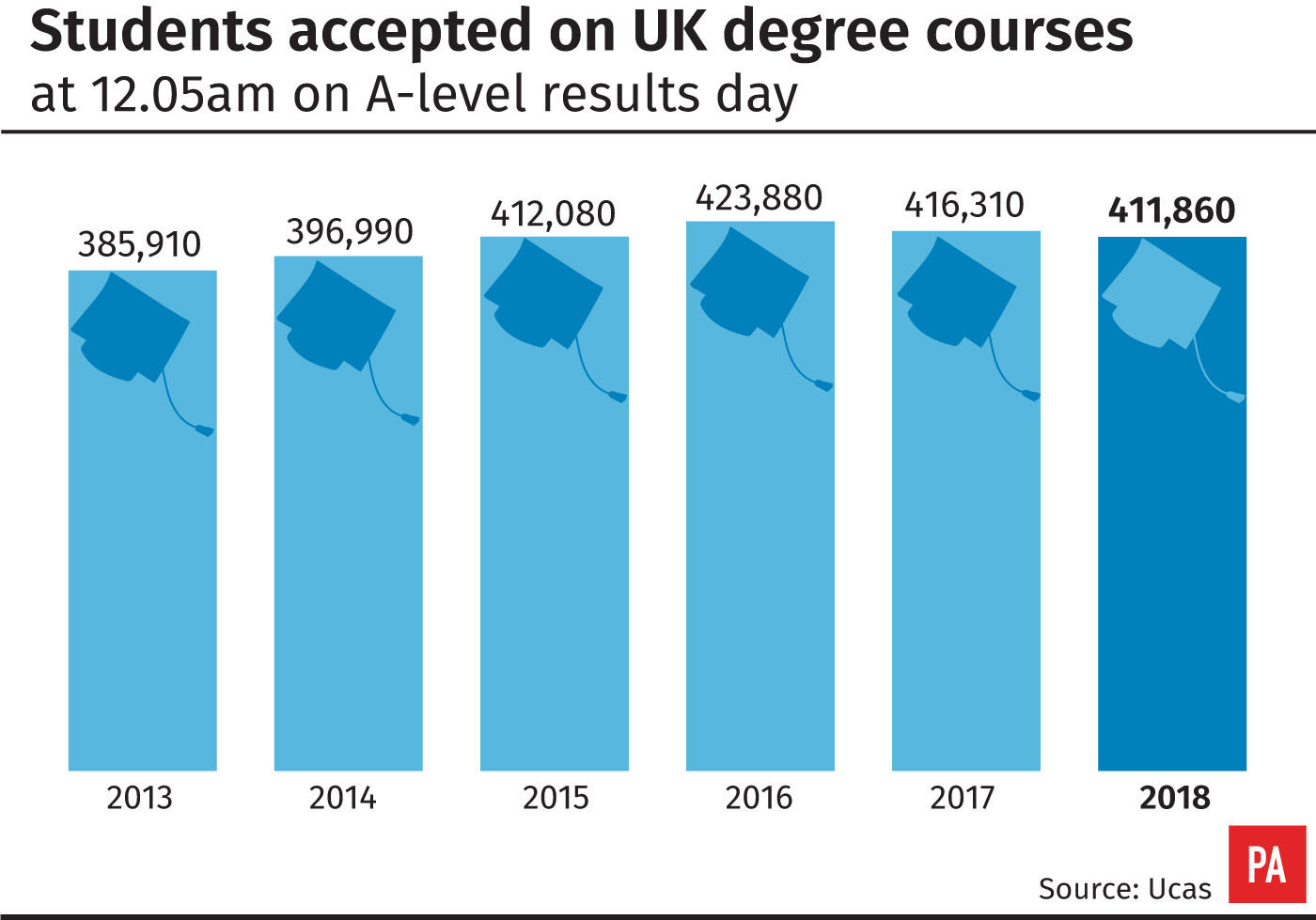
There has been a fall in the number of students accepted on degree courses at UK universities, early figures show.
In total, 411,860 students – from the UK and overseas – have taken up places, down 1% compared with the same point last year, according to initial data published by admissions service Ucas.
A breakdown shows 353,960 UK students have been accepted on to undergraduate courses, down 2% on 2017.
 (PA Graphics)
(PA Graphics)
But there is an increase in international students, with 26,400 EU applicants accepted to study at UK universities – up 1% on last year.
A record 31,510 students from nations outside the EU have taken up places – a 4% increase.The figures are a snapshot taken by Ucas shortly after midnight.
The admissions service said that in England, a record 27.9% of the 18-year-old population has been accepted on to courses, with a record 26.3% in Wales.
In Northern Ireland, the entry rate is 28.1%, while in Scotland – where results were published last week – 25.9% of 18-year-olds have been accepted.
Clare Marchant, Ucas chief executive, said an increase in the proportion of youngsters from disadvantaged background was “excellent news”.
Some 16.1% of those from the most disadvantaged backgrounds have been accepted – up 0.4 percentage points.
She added: “However, the continuing gap between the most and least advantaged is frustrating, and we’ll keep on working with universities to help them evaluate their outreach activities to impact the most disadvantaged students.
Clearing places are updated regularly so keep an eye on our search tool! https://t.co/sJGwPDc3SI #Clearing2018 pic.twitter.com/irXfodU6KI
— UCAS Online (@ucas_online) August 16, 2018
“The encouraging growth in international students choosing to study in the UK is testament to the welcome of our world-class universities.
“I’d advise anyone thinking about securing a place through clearing to take some time to visit universities and colleges in the next few days. This weekend’s open days are listed on the Ucas website. Seeing everything in person can help you make the right decision.
“If you decide your next step isn’t a degree though, information on apprenticeships, gap years and career options is also available on ucas.com.”



Why are you making commenting on The Herald only available to subscribers?
It should have been a safe space for informed debate, somewhere for readers to discuss issues around the biggest stories of the day, but all too often the below the line comments on most websites have become bogged down by off-topic discussions and abuse.
heraldscotland.com is tackling this problem by allowing only subscribers to comment.
We are doing this to improve the experience for our loyal readers and we believe it will reduce the ability of trolls and troublemakers, who occasionally find their way onto our site, to abuse our journalists and readers. We also hope it will help the comments section fulfil its promise as a part of Scotland's conversation with itself.
We are lucky at The Herald. We are read by an informed, educated readership who can add their knowledge and insights to our stories.
That is invaluable.
We are making the subscriber-only change to support our valued readers, who tell us they don't want the site cluttered up with irrelevant comments, untruths and abuse.
In the past, the journalist’s job was to collect and distribute information to the audience. Technology means that readers can shape a discussion. We look forward to hearing from you on heraldscotland.com
Comments & Moderation
Readers’ comments: You are personally liable for the content of any comments you upload to this website, so please act responsibly. We do not pre-moderate or monitor readers’ comments appearing on our websites, but we do post-moderate in response to complaints we receive or otherwise when a potential problem comes to our attention. You can make a complaint by using the ‘report this post’ link . We may then apply our discretion under the user terms to amend or delete comments.
Post moderation is undertaken full-time 9am-6pm on weekdays, and on a part-time basis outwith those hours.
Read the rules hereLast Updated:
Report this comment Cancel